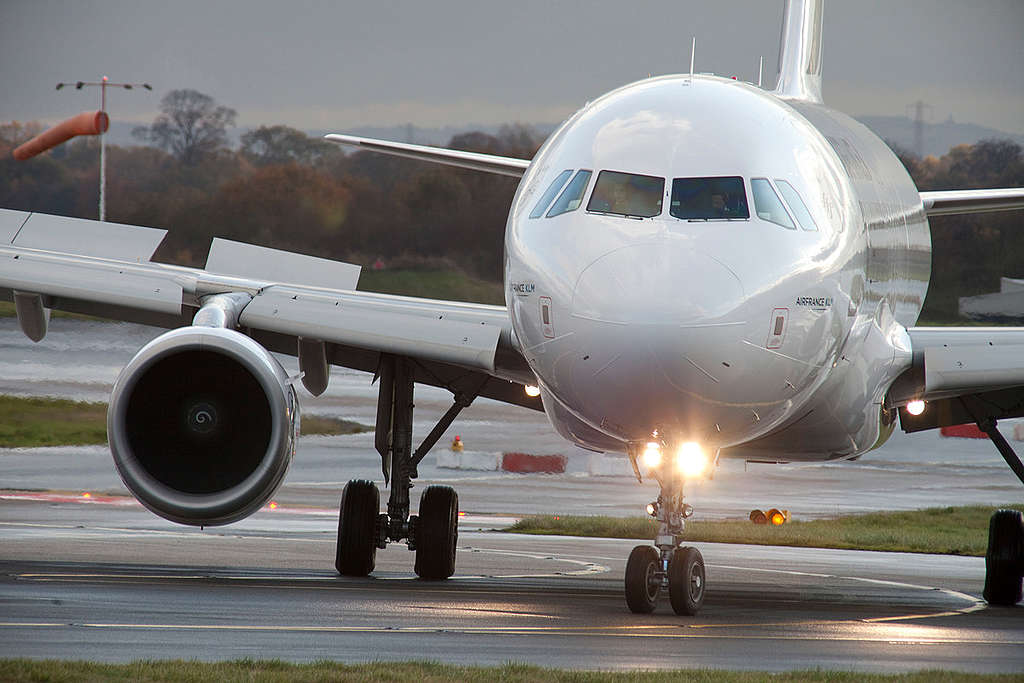
Glasgow – The UK led International Aviation Climate Ambition Coalition is asking countries at the international climate summit to push for a global target to cut aviation emissions to levels compatible with the Paris Agreement by 2050.
But Greenpeace slammed the declaration as brazen greenwashing, as signatories embrace offsetting and so called ‘sustainable aviation fuels’ which could include biofuels as the main route to cutting aviation emissions when instead they should be reducing flights and massively investing into rail and greener travel options.
The declaration, which has already been signed by the UK, the US, France, Spain and a range of other countries, is relying on technologies that don’t yet exist or won’t be available any time soon.
Greenpeace calls on European leaders and the European Commission not to sign the declaration, and urges them to ban short-haul flights and to massively invest in rail.
Greenpeace transport campaigner Klara Maria Schenk said: “This announcement is full of scams like offsetting, and excessive optimism on so-called ‘sustainable aviation fuels’ and future aircraft designs. But it lacks the one thing that’s needed to deliver the goal of limiting temperature rise to 1.5C – which is tangible action to prioritise green travel and reduce flights.
“At COP, the final decision must commit to phase out fossil fuels, which means reducing demand for those fuels from industries like aviation.
“Policy-makers and countries should ban short-haul flights wherever a viable alternative already exists, and invest in rail to create a transport system that’s good for the planet while also being affordable and accessible to all.”
ENDS
Contact:
To set up interviews with experts, contact Greenpeace EU Mobility For All Comms Lead: Marianne Laemmel, [email protected], +43 664 881 72245
Notes to Editors:
Greenpeace is especially opposing the existing CORSIA regime and its potential expansion. CORSIA is purely based on offsetting and has no single element of reducing flights and real flight emissions, despite the R in CORSIA stands for reduction.
A Greenpeace EU report recently revealed that many short-haul flight routes in Europe have train alternatives under six hours; and that 3.5 Million tonnes of CO2 could be saved by only replacing these connections by trains. Countries like France, UK and Spain – which have all signed the declaration – belong to those countries with the highest potential to shift short-haul flights to trains.
CO2 emissions are only part of the climate impact of aviation. Non-CO2 impacts are complex and hard to pin down but according to an EU review are “warming the climate at approximately three times the rate of that associated with aviation CO2 emissions alone”.
There is no model for how this proposed long term target could work but the ‘Sustainable Aviation 2050’ group (an industry body) has described how it would work, including a carbon price of around $300/tonne – which does not appear to be part of any industry or government plan.
Other techniques for cutting emissions include substantial emissions savings from ‘future aviation types’ which aren’t yet available, and ‘Sustainable Aviation Fuel’ for which there exists no commercially viable process for delivery at scale.
The remainder is to be accommodated through ‘market-based mechanism’ i.e. offsets, as this is the mechanism (CORSIA) for balancing aviation growth globally agreed by the International Civil Aviation Organisation. These offsets are likely tree-planting or alleged forest protection projects, and it is very unclear where, or if, tree planting at such a large scale would be possible, aside from the flaws that are known to exist with such schemes.
